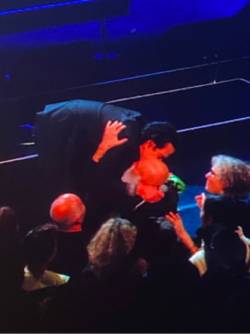Issue #306 / December 2024
I used to play Into My Arms for my girlfriend. I came to your concert in Birmingham, but I had to leave early. It was far too emotional for me and reminded me of the amazing times I had with my girlfriend, which I know I will never get back.
STELLAN, NANTWICH, UK
Dear Stellan,
Live music is a ritual that evokes a common emotional response to which we attach our singular experiences. When I perform on stage, I can see these unique and particular feelings play out on each face. This is one of the great privileges of being a frontman, and it is why I spend so much time close to the audience. I love to watch the emotions on people’s faces – joy, sorrow, yearning, laughter, fear, rage. The concert becomes powerfully and empathetically transactional as we experience together the therapeutic nature of the music. As the show evolves, a to-ing and fro-ing of kindness emerges, energised by our mutual regard, and the healing begins.
A live concert can feel overwhelming, even frightening, because its emotional power can suddenly bring our most buried experiences to the surface. But feelings are meant to be felt – that’s what they are for. We heal by acknowledging our emotions and test our heart’s resilience by lingering within the unbearable. It is something music can help us do. We find our hearts are much stronger than we presumed, and what we thought was unbearable was nothing of the sort. Music draws forth these subterranean feelings and simultaneously rescues us from them.
I’m happy you came to the concert in Birmingham, Stellan, but I think it was a lost opportunity to “leave early” from a feeling before it had run its course and done its reparative work. I understand it must be painful to feel those “amazing times” are behind you, but they are not, there are many more to come. There will be further heartbreaks too, but hearts break stronger. We must not retreat from our feelings. We must confront them. Rehearse them. Get better at them. To paraphrase Samuel Beckett – hurt, hurt again, hurt better. This is one of the things live music allows us to do – to hurt and heal concurrently.
My advice? Get back out there. Live life to the fullest – and stay for the whole damn show. It’s amazing.
Love, Nick

